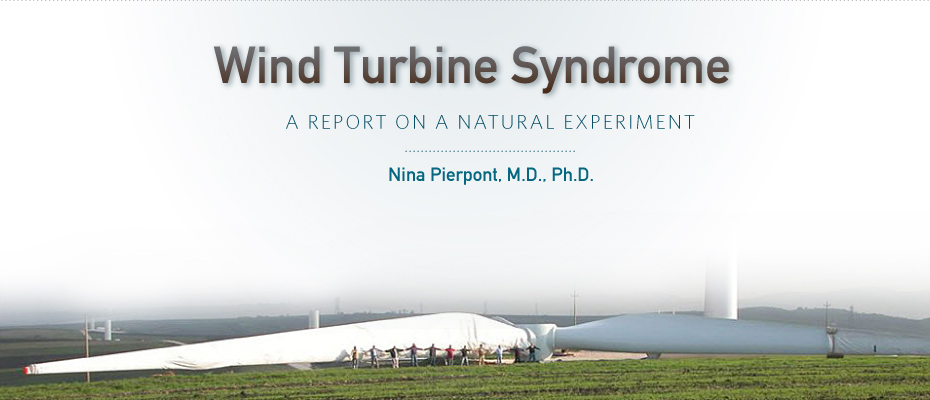Pierpont to Wellfleet regarding 1.8 MW turbine (Massachusetts)
Mar 27, 2010
The following is from Nina Pierpont to Paul Sieloff, Wellfleet Town Administrator, who asked why she thought her research on WTS would have any bearing whatsoever on the single Vestas V90 that Wellfleet proposes to build in town. Click here for Sieloff’s letter.

Photo from Vestas website, with human figure added for perspective
3/27/10
Dear Mr. Sieloff,
Thank you for your interest in my work. A few clarifications. I did not document potential health impacts; I documented actual health impacts, on both at-risk people (whom I define in my research, and who comprise a large proportion of any American population) and on people without known risk factors. In addition, my research data, analysis, literature review, and conclusions are not the same as anecdotal reports and should not be confused as such.
You may be further interested to know that I have been invited by the editor of an American peer-reviewed medical journal to write an article on my research. This is because scientists who know about inner ear functioning are highly interested in my work, and see that I approach their field with rigor and accuracy.

With appreciation to MedlinePlus
My research was also presented earlier this month at the annual meeting of the Prosper Ménière Society (an international society of scientists and clinicians who research hearing, balance, and the inner ear) by a medical school physiology professor.
With regard to the question in your letter, the single 1.8 MW Vestas V90 wind turbine your village proposes to build within the Cape Cod National Seashore will be capable of causing adverse health effects on both people and animals, for the following reasons:
1) I interviewed two American families in the course of my research who had identical symptoms to the study families, but while living near only single, 10 kW turbines. One of the families frequently went away to feel better and restore their children’s functioning, and finally managed to get the turbine shut down. They experienced relief when away and after the turbine was shut down. This turbine was 180 times less powerful (in terms of wattage) than the single turbine you propose.
2) Some families in my study, who lived near groups of large turbines (as you describe in your letter), identified specific individual turbines that were particularly noisy and whose operation individually correlated with their symptoms.
3) Measurements at a single 200 kW turbine in Germany demonstrate significant amount of infrasound (see Ceranna et al 2005). This turbine is 9 times less powerful than the turbine you propose.
4) All vertebrates (fish, amphibians, reptiles, mammals, and birds) have similar inner ear vestibular organs. These organs detect motion, acceleration, orientation to gravity, and changes in ambient pressure. From fish on up, these organs have been evolutionarily conserved. They are linked neurologically to alerting and escape behaviors.
5) During my research interviews I collected anecdotal information on animal problems. I heard about moles, deer, dogs, horses, ponies, alpacas, goats, seals, sea eagles (Norway), killdeer, and frogs—all of whom disappeared, behaved abnormally, and/or had observed reproductive failure.
6) It is documented in the scientific literature that bats’ lungs and abdominal organs hemorrhage when they fly through the pressure shifts around wind turbine blades (Baerwald EF, d’Amours GH, Klug BJ, Barclay RM. 2008. Barotrauma is a significant cause of bat fatalities at wind turbines. Current Biology 18[16]: R695-96).
7) It is also documented that ground squirrels near wind turbines in California show behavioral changes, spending increased time and energy on vigilance and caution, compared to squirrels that do not live near turbines (Rabin LA, Coss RG, Owings DH. 2006. The effects of wind turbines on antipredator behavior in California ground squirrels [Spermophilus beecheyi]. Biological Conservation 131:410-420). Effects like these in animals commonly affect breeding success and population size.
Mr. Sieloff, you are in a position of responsibility as town administrator and as a government official working on a project in a national preserve. It is of great interest to your community, and the larger American community, to know what measures you plan to take in this project to safeguard:
1) Human health
2) Homeowners’ property values (i.e., if a family or one family member can no longer tolerate living in a permanent home or visiting a summer home, and they need to sell the property)
3) Breeding and migrating animal populations in the Cape Cod National Seashore
I look forward to your reply, as do your local and our national communities.
With best wishes,
Nina Pierpont
Nina Pierpont MD, PhD
19 Clay
Malone, NY 12953
Author of Wind Turbine Syndrome: A Report on a Natural Experiment. K-Selected Books, 2009.
MD—The Johns Hopkins University School of Medicine, 1991
PhD—Princeton University, Dept of Ecology, Evolution, and Behavior, 1985

